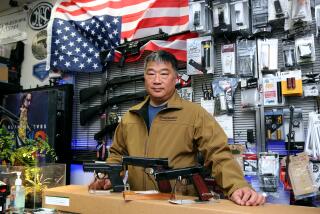Darra Adam Kehl: Pakistan’s Wild West Town and Discount Supermarket of Guns
- Share via
DARRA ADAM KHEL, Pakistan — A bearded tribesman with a turban and bandoleer steps into the street and sprays the air with bullets from an automatic assault rifle.
Not a single head turns at the deafening stutter of fire.
The tribesman, with the studied coolness of Clint Eastwood, tosses the gun back to the storekeeper and, with a shake of his head, moves along to the next shop.
There are more guns for him to choose from in Darra Adam Khel, the nearest thing Pakistan has to a Wild West town.
In fact, guns are about the only things made and sold in this dusty one-street town near Peshawar, capital of the country’s unruly Northwest Frontier Province bordering Afghanistan.
What Bangkok or Singapore can do in fake designer watches or clothes, Darra does with weapons.
Excellent copies of American, Russian, Chinese and European arms are forged by hand in the hundreds of tiny workshops behind the brightly painted storefronts.
Kimat Khan makes a nice line of replica Chinese and Russian Kalashnikov automatic rifles, turning out a copy in just 20 days at a third of the $1,000 cost of the original.
His neighbor, who obviously has bigger ideas, busily copies an anti-aircraft gun captured from Soviet troops in Afghanistan.
One man even turns out a fountain pen marked “Made in Japan,” which fires a lethal .25-caliber bullet.
Customers who do not want copied weapons can buy the real thing--smuggled, of course.
Saleem Khan’s shop has a fine display of Chinese anti-tank shells tastefully set off by an arrangement of Kalashnikovs and imported ammunition.
“If we do not have what you want, we can get it made or brought in,” he said with pride.
His words were punctuated by the crackle of fire across the pot-holed street from a youth trying out a pistol.
Weapons have never been in short supply in the Pashtu-speaking areas near the Khyber Pass, where tribal--not Pakistani--law applies.
The Pashtun hill tribes, also know as Pathans, are the most romanticized of all the peoples of British India. They won autonomy from the British and were even given regular cash payments for good behavior. A gun is as important to a Pashtun as his sense of tribal loyalty and honor.
In 1897 the British allowed them to keep their arms factories, believing it would be better if the tribes had supposedly inferior homemade weapons rather than more reliable imported ones.
Pakistan inherited this system and still allows Pashtuns to make and carry arms freely, whereas other Pakistanis need gun licenses.
Since the upheavals in Afghanistan and Iran in the late 1970s, the region has become even more lawless. Major operations include drug smuggling and large-scale sale of weapons. Anti-Soviet Afghan rebels based in Pakistan receive arms from abroad, and some are then sold in local bazaars.
“When the Afghan war started, the Muslim insurgents bought guns from us,” a shopkeeper said. “Now they get the real thing from abroad.”
Nevertheless, business is thriving with Darra’s 200 shops, which turn out more than 100 rifles a day. Foreigners cannot visit the town without government permission, but Pakistanis flock to it.
“We deliver anywhere in Pakistan,” boasted one shopkeeper who had just sold a shotgun to a group of tribesmen from southwestern Baluchistan province. “We get orders from India and Iran too.
“A lot of customers just want something for self-protection. They may only use it a few times a year, so they buy our cheaper guns rather than the original.”
More to Read
Sign up for Essential California
The most important California stories and recommendations in your inbox every morning.
You may occasionally receive promotional content from the Los Angeles Times.













